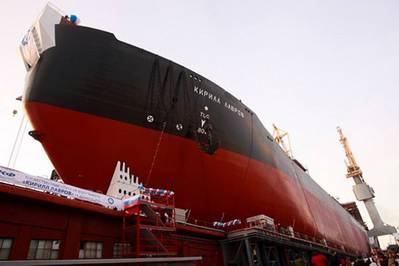Sanctions Bite Russian Arctic Oil Shippers
Shipping services that support Russia's attempts to extract oil from remote parts of the Arctic will run into difficulties as banks scale back energy financing due to Western sanctions, increasing transport costs for the frontier sector.
Sanctions imposed on Russia by the United States and European Union over Ukraine have targeted the delivery of oil technology, goods and services, aiming to make it impossible for Moscow to access new oil sources.
The world's largest energy exporter, Russia relies on oil and gas exports for about half its federal budget. With conventional oil fields in decline, it needs to exploit sources in remote parts of Siberia and the Arctic to keep oil flowing.
While the shipping industry has so far been broadly excluded from sanctions, industry sources say the sector is starting to feel the effects because of fears about doing business with Russian companies that are under sanctions.
Any ship supply service involved with Russian companies included in the sanctions is expected to face difficulties.
"Sanctions cannot be circumvented by contracting with another Russian entity," said Michael Kingston of law firm DWF.
"The sanctions raise serious question marks over certain deals being contemplated and could have the effect of causing those not to go ahead."
Ice-breaking tankers, needed to ferry oil and gas from the Arctic, are subject to extreme weather conditions and icebergs, and can cost up to $300 million, or 50 percent more than normal tankers.
Russia's state-owned United Shipbuilding Corporation has been targeted by Washington, and accounts with a Nordic bank operated by United's Finnish partner are about to be shut down because of nervousness about sanctions.
Arctech, which builds icebreakers and other Arctic offshore vessels, will see its Nordea bank (NDA-SEK.ST) accounts closed in a few weeks, Arctech's managing director Esko Mustamaki said.
"It is true that the U.S. sanctions have influenced our banking relations. Our Nordea accounts will be closed in a few weeks time," Mustamaki told Reuters.
Nordea, the Nordic region's biggest bank, said it fully complied with sanctions without giving further details.
Shipping sources say the loss of banking services is likely to complicate orders by Russia for icebreaker ships.
"This could impact medium to longer term exploration and field development plans of Russian oil and gas companies and may necessitate other partners being found who are not bound by any U.S. or EU economic sanctions. Probably Chinese investors will step in and fill the funding void," said one industry source.
Tero Vauraste, chief executive of Finland's Arctia Shipping, which owns and operates a fleet of icebreakers with no Russian operations at present, said sanctions could mean fewer Western-owned transport ships will be available in future.
"The current situation makes Western investors at least hesitant even though their services would not be among those sanctioned," Vauraste said.
A sanctions manager at a major British-based bank said lenders were increasingly cautious of Russian exposure.
"The banks generally appear to be saying, 'if we are not sure we should say no,'" the manager said.
Losing Out
Norway, which is not a member of the EU but part of the European Economic Area trade agreement, has agreed to implement EU sanctions and is among those that stand to lose out.
Sturla Henriksen, head of the Norwegian Shipowners' Association, said 25 Norwegian offshore vessels were operating in the Kara Sea off Russia's Arctic coastline.
"This obviously hits Norwegian operations. It will probably impact their operations in terms of the possibilities for prolongation of contacts," Henriksen said.
Industry sources say the huge Yamal liquefied natural gas project in the Arctic may now provide fewer opportunities for shipping companies. Washington imposed sanctions on Yamal's Russian partner Novatek (NVTK.ME) and its co-owner Gennady Timchenko, a close ally of President Vladimir Putin.
Russian Energy Minister Alexander Novak said last month he hoped the suspension of work by U.S. oil major Exxon Mobil (XOM) in the Kara Sea because of Western sanctions would not affect wider offshore exploration in the Russian Arctic. Exxon Mobil had been working with Russia's top oil producer Rosneft there.
Rosneft has pledged to continue drilling in the Kara Sea alone if Exxon cannot get back on board by the time the next weather window opens in 2015, but how it does this is a major question. Rosneft declined to comment.
The other Arctic project is Prirazlomnoye run by Gazprom Neft, which is already pumping oil.
Gazprom Neft, also targeted by sanctions, said uninterrupted supplies and safe operations of the Prirazlomnoye platform are being provided by a fleet of five vessels. "The existing tanker fleet is enough to take all necessary oil volumes from the Prirazlomnoye field," it added.
Russia's state-owned Sovcomflot declined to comment, while Rosatomflot, another major Russian state-owned player in the Arctic shipping sector, did not respond to requests for comment.
Safety Measures
Shipping sources raised concerns that projects aimed at improving shipping safety could be affected by the tensions between Moscow and the West.
Among them is a British-Russian radio navigation initiative that aims to provide a back-up to satellite-based systems prone to signal loss in bad weather.
The General Lighthouse Authorities of the UK and Ireland (GLA) is pioneering a system called eLoran and collaborating with Russia, which operates a similar system called eChayka.
Russia's Internavigation Research and Technical Centre, which is developing eChayka, did not respond to requests for comment.
George Shaw of the GLA said: "The sanctions may interrupt the freedom of trade, but wherever it is possible we clearly want to ensure the international safety of future shipping in the Arctic and that is recognised on both sides."
(By Jonathan Saul; Additonal reporting by Alister Doyle in Oslo, Johan Ahlander in Stockholm and Ekaterina Golubkova in Moscow; Editing by Veronica Brown and Giles Elgood)












